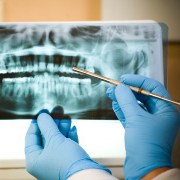 Photo: Getty Images
Photo: Getty Images
In my previous article I discussed mercury and vaccines as possible causes of autism. Now, I will look at elements that babies are exposed to in the womb that may predispose them to getting autism.
Mercury Amalgam Fillings
Mothers who have mercury fillings, which contain 50 percent mercury, when pregnant, or who have them before pregnancy, may have an increased risk of having a child with autism. Although mercury fillings have been used for more than 150 years, the safety of such a practice was not studied until recently.
A review published in 2009 found that:
"Mercury from maternal amalgam fillings leads to a significant increase of mercury concentration in the tissues and the hair of fetuses and newborn children. Furthermore, placental, fetal, and infant mercury body burden correlates with the numbers of amalgam fillings of the mothers. Finally, mercury levels in amniotic fluid and breast milk correlate significantly with the number of maternal dental amalgam fillings." (1)
So pregnant women who have mercury fillings could end up leaching mercury into their amniotic fluid and passing it through the placenta to give their babies' bodies burdensome amounts of mercury before they are even born.(6)
If the mother has the fillings removed during pregnancy, this can make the situation worse and cause more mercury to be released. When she begins to breast feed, her baby gets additional mercury from the milk. A study in sheep found that after ewes were given new amalgam fillings and they nursed foster lambs, the lambs received some of this mercury.
"Neonatal uptake of mercury (Hg) from milk was examined in a pregnant sheep model, where radioactive mercury (Hg203)/silver tooth fillings (amalgam) were newly placed. A crossover experimental design was used in which lactating ewes nursed foster lambs. Results from the animal studies showed that during pregnancy, a primary fetal site of amalgam Hg concentration is the liver and after delivery, the neonatal lamb kidney receives additional amalgam Hg from mother's milk. It was concluded that Hg originating from maternal amalgam tooth fillings transfers across the placenta to the fetus, across the mammary gland into milk ingested by the newborn, and ultimately into neonatal body tissues." (2)
Anti-D injections
Anti-D injections are given to rhesus (Rh) negative mothers during pregnancy to reduce the risk of fetal Rh (positive blood mixing with theirs and causing an immune system reaction). This is called rhesus disease or feto-maternal haemorrhage.
This can occur during childbirth but mainly occurs if the mother has had an invasive medical procedure such as amniocentesis or chorionic villus sampling. Feto-maternal haemorrhage can cause the baby to become anemic and need an in utero blood transfusion, which carries a 2 percent risk of fetal death. (3,4)
However, some brands of anti-D injection used to contain mercury and it has been implicated as a possible cause of autism. A 2008 study by the Institute of Chronic Illnesses found that Rh-negative mothers were much more likely to have children with neurological disorders, compared with Rh-positive mothers.
Thimerosal was removed from the U.S. anti-D injections in 2002 and researchers discovered that the children born in 2002 or later had the same risk of neurological disorder as those in the Rh-positive group, but those before 2002 had a higher risk, suggesting that the anti-D injection was the causative factor.
"There were significant and comparable increases in maternal Rh-negativity among children with NDs (Clinic: A=24.2 percent), autism spectrum disorders (Clinic: A=28.3 percent, B=25.3 percent), and attention-deficit-disorder/attention-deficit-hyperactivity-disorder (Clinic: A=26.3 percent) observed at both clinics in comparison to both control groups (Clinic: A=12.1%, B=13.9 Percent) employed. Children with NDs born after 2001 had a maternal Rh-negativity frequency (13.6 percent) similar to controls." (5)
Removing the mercury from anti-D injections seemed to be a positive step in reducing the number of children with autism and ASDs.
Sources:
1. A prospective study of prenatal mercury exposure from maternal dental amalgams and autism severity, Acta Neurobiologiae Experimentalis. Acta Neurobiol Exp 2009, 69: 1–9.
Abstract: http://www.iaomt.org/news/files/files302/Amalgam_Autism_Geier_2009.pdf
2. Vimy MJ et al., Mercury from maternal "silver" tooth fillings in sheep and human breast milk. Biol Trace Elem Res.1997 Feb;56(2):143-52. Abstract:
http://www.ncbi.nlm.nih.gov/pubmed/9164660
3. Birth Defects, Rh Disease, March of Dimes. Web. 9 September 2011. http://www.marchofdimes.com/birthdefects_rh.html
4. A156 Pregnancy (rhesus negative women) - routine anti-D (review): guidance, National Institute for Health and Clinical Excellence. Web. 9 September 2011.
http://guidance.nice.org.uk/TA156/Guidance/doc/English
5. Neurodevelopmental disorders, maternal Rh-negativity, and Rho(D) immune globulins: a multi-center assessment, Neuroendocrinology Letters. 2008 Apr;29(2):272-80. Abstract:
http://www.ncbi.nlm.nih.gov/pubmed/18404135
6. Lugliè PF et al. Mercury determination in human amniotic fluid. Minerva Stomatol. 2000 Apr;49(4):155-61.
Abstract:
http://www.ncbi.nlm.nih.gov/pubmed/11040541
Joanna is a freelance health writer for The Mother magazine and Suite 101 with a column on infertility, http://infertility.suite101.com/. She is author of the book Breast Milk: A Natural Immunization, and co-author of an educational resource on disabled parenting.
She is a mother of five who practised drug-free home birth, delayed cord clamping, full term breast feeding, co-sleeping, home schooling and flexi schooling and is an advocate of raising children on organic food.
Reviewed September 21, 2011
by Michele Blacksberg RN
Edited by Malu Banuelos






Add a Comment34 Comments
Joanna,
the authorities are cracking down on Dr Geier because of his untested and damaging Lupron Protocol - not because of his court activities as an expert witness. There are high profile doctors in the USA who question vaccines and are not investigated: Bob Sears, Jay Gordon, Jerry Kartzinel, Bryan Jepson etc.
His role as an expert witness was only questioned when he stepped beyond his areas of expertise to dabble in the field of autism.
Regarding slamming the door on victims of vaccine injury, I must disagree. Your vaccine injury compensation scheme is one of the most generous in the world. The claimants costs are paid whether they win or lose and the standard of proof, "50 per cent plus a feather" is far more lenient than the "beyond reasonable doubt" of the UK system.
Your claims about science do not stand up to scrutiny. It was pro vaccine scientists who raised the alarm over thimerosal. Pro vaccine scientists banned Rotashield because of the real but minuscule risk of intussusception.
Regarding immunity, civil courts were handing out punitive damages to vaccine manufacturers that threatened to close down the vaccine indutry. Governments took on the burden of compensation because they wanted to preserve the vaccine programme. The irony is that the original DTP cases that threatened to bring down the system and forced the government to act were not caused by DPT at all. The real reason was a genetic disorder, Dravet's Syndrome that causes epilepsy and mental retardation in children and emerges around the time of the DPT vaccination. Hence the mantra of pro vaccine scientists, "Correlation is not Causation."
Neurodiversity is not a theory. It is a fact. There is not a single standard model for neurological development. There is diversity. And without diversity there can be no evolution. Some examples of diversity will turn out to be evolutionary cul-de-sacs. But we cannot know in advance. High functioning autism may be the next step in evolution. It may not. Evolution favours those best placed to exploit their environment. If the environment rewards smarts then smarts will prevail. But not necessarily.
I am glad you support evolutionary theory. But I suggest you look elsewhere for your information. The site you linked to is actually a Creationist website.
September 26, 2011 - 4:31pmThis Comment
At least Geier is trying to help recover autistic children. The standard medical model says that autism is a mental disorder that is incurable and nothing can be done other than things like speech therapy and special ed. I know parents who have children who are now off the spectrum due to biomedical and other interventions. The medical model for autism also refuses to treat children's bowel disease which they say isn't related to autism but which lots of autistic children suffer from, so I don't think they are right on that one. One parent I know (whose child was one of the 12 in the Wakefield case series) told me that when her child had a life threatening bowel emergency and she took him to ED, she was told 'We will treat the emergency, not the condition'. They are too scared to touch these children because it is too political. Autistic children with bowel disease can't get treatment in the UK. Parents are told that having bowel problems is just a symptom of autism and the doctors do nothing about it. They have to go to the States to get the right care.
If it was pro-vaccine scientists who raised the alarm over thimerosal then why would they take most of it out with one hand and put it back in with the other hand? There is study after study citing concern about thimerosal, even up to 2011, they make a big hoo ha over reducing it in the childhood schedule and then they add in yearly flu shots and H1N1 shots and Hep B shots with thimerosal. And then they say that autism has continued to climb when they are still giving thimerosal containing vaccines. Seems a bit under-hand and deceitful to me.
Regarding DPT, they WOULD say that, they have an industry to protect, which appears to be more important than the children.
Check out this: The US Vaccine Injury Compensation Program (VICP) sets a lower bar for evidence of vaccine-related harm than would be accepted in civil courts, but that's what it takes for the program to succeed in helping to protect the vaccine supply, according to a report by two Canadian analysts.
The VICP was established by a 1986 law designed to protect vaccine makers from most lawsuits alleging vaccine-related injury, while giving people claiming such injuries an opportunity to get a fair hearing and potentially receive compensation from the government. Compensation funds come from a tax on vaccines. The law made it harder for plaintiffs to prove claims that healthcare providers failed to warn of adverse events.
They argue that if the vaccine court had the same evidence standards as civil courts, petitioners would be more likely to file civil lawsuits, since damage awards in that arena are potentially greater. Also, plaintiffs who fail to win compensation in the VICP are unlikely to go to the civil courts, with their tougher standards. The compensation program thus "will likely divert hundreds if not thousands of autism cases from proceeding to civil litigation," the article says.
http://www.cidrap.umn.edu/cidrap/content/other/news/sep2711vicp.html
It's not about helping victims of vaccines, it's about protecting the vaccine supply and the manufacturer's and preventing patients from taking them to court. That is just wrong on so many levels. If I had a botched childbirth I would expect to be able to take the hospital to court, a proper court.
I hardly call £120,000 a generous compensation. If you have a brain damaged child that needs 24 hour care, disability aids, medical equipment etc etc, that money is not going to pay for their life time care, and these kids should be compensated for life. Most parents have to give up their career to look after their damaged child and they aren't compensated for that. And you can't get any compensation at all in the UK system if your child died as a result of vaccines, under the age of 2 years. Since most of the vaccines are given at less than 2 years old, this is crazy. A dad who lost his 17 month old daughter showed me a letter saying they could not consider his claim because she was under 2 when she died!
http://www.direct.gov.uk/en/MoneyTaxAndBenefits/BenefitsTaxCreditsAndOtherSupport/Disabledpeople/DG_10018714
They just think up ways to avoid taking responsibility for something they caused.
People can believe in evolution and God, you know. I believe in God, I think he invented evolution :)
Try telling health visitors there is no standard neurological model for development. Just take a look at 'the red book' of any child and you will see there are standards they work to. When my son didn't say 50 words at 2 years old (he only said 2 words), they said he 'failed' his development check. He also didn't draw so he failed that too. I'm not saying we can't all be different, but evolution wouldn't make us go backwards. They wouldn't make us unable to tend to our toilet needs, unable to communicate, unable to live without help. Nature always kills off the weakest. I know I would die in the wild. Nature is about improving the species. You said it yourself that evolution favours those best placed to exploit their environment, and autistic children can't do that, not classically or regressively autistic children anyway.
September 29, 2011 - 5:19amThis Comment
You describe Geier et al (2009) as a review when it is titled "A prospective study of prenatal mercury exposure from maternal dental amalgams and autism severity." A review article normally examines all the published evidence for and against a hypothesis. Geier et al (2009) is a study of human subjects that is testing the hypothesis that there is a connection between mercury exposure and autism. We can argue about the merits of this particular study but I hope we can agree that it is not a review.
This is important because you quote directly from the introduction to suggest that based upon a review of the literature Geier et al (2009) found that,
"Mercury from maternal amalgam fillings leads to a significant increase of mercury concentration in the tissues and the hair of fetuses and newborn children. Furthermore, placental, fetal, and infant mercury body burden correlates with the numbers of amalgam fillings of the mothers. Finally, mercury levels in amniotic fluid and breast milk correlate significantly with the number of maternal dental amalgam fillings."
No they did not. Geier et al (2009) did not examine "mercury concentration in the tissues and the hair of fetuses and newborn children." Nor did they examine the correlation between "placental, fetal, and infant mercury body burden [and] the numbers of amalgam fillings of the mothers. Nor did they test whether "mercury levels in amniotic fluid and breast milk correlate significantly with the number of maternal dental amalgam fillings."
What they did was to take 100 people with an ASD and look for correlations between the severity of their autism and the number of dental fillings their mothers had, either prior to or during their pregnancy. They acknowledge that they did not measure mercury exposure but instead took the number of fillings as a proxy measure of exposure. We do not know when these fillings occurred in relation to their pregnancies and we do not know whether they used mercury amalgams. And, neither it seems, do the authors.
"In addition, since information on the numbers of fillings but not information on: their size (surface area), the nature of the amalgam alloy used, or the location of the amalgam in the mouth was available to researchers in this study, the effects of: the amalgam size (surface area) of the fillings; the intrinsic mercury release rates for the amalgam composition installed; and chewing friction, are confounders that further reduce the magnitude of the observed effects." (Geier et al 2009)
All we can conclude from Geier et al (2009) is that there may be a relationship between maternal dental health and the severity of ASD. Given that Dr Geier already has a reputation for misrepresenting the facts, http://neurodiversity.com/weblog/article/217/ for you to misrepresent him even further does nothing to support your case.
Mike Stanton
September 24, 2011 - 3:50pmThis Comment
A Mark Geier study? Really, Joanna? Did Michele Blacksberg, RN, actually read your draft before signing off?
September 22, 2011 - 7:48amThis Comment